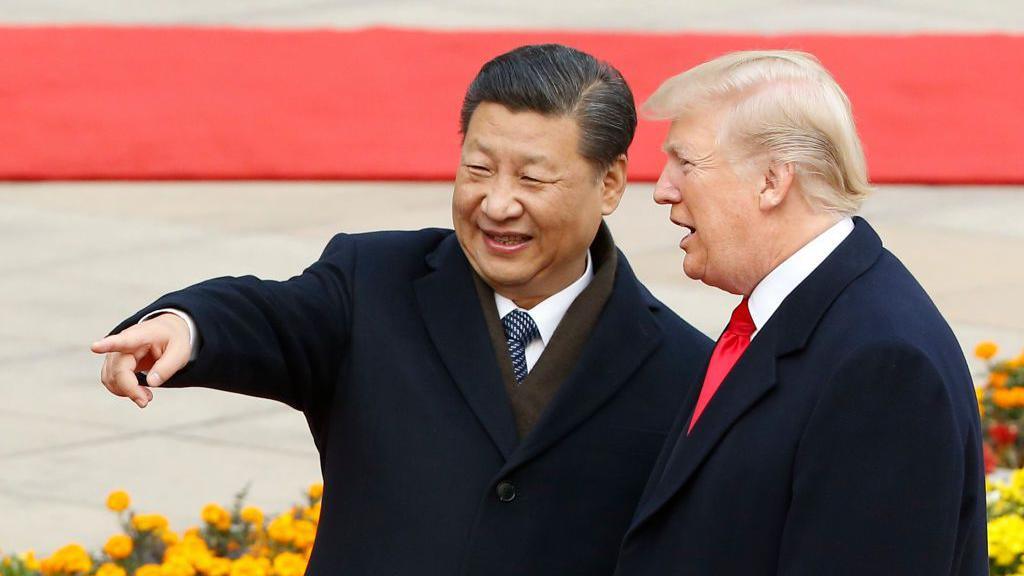“`html
Former President Donald Trump has suggested he may withdraw from a planned meeting with Chinese President Xi Jinping following Beijing’s implementation of stricter regulations on rare earth exports.
In a social media post, Trump stated he saw “no reason” to meet with President Xi later this month, accusing China of “becoming very hostile” and attempting to hold the world “captive”.
He also threatened a “massive” increase in tariffs on Chinese goods, sparking concerns about a potential escalation of trade tensions between the two major economic powers.
Financial markets reacted negatively to the remarks, with the S&P 500 falling 1.8% in mid-afternoon trading in New York.
China is the dominant producer of rare earths and other critical materials essential for manufacturing cars, smartphones, and various other products.
A previous instance of tightened export controls by Beijing, following Trump’s tariff increase on Chinese goods earlier this year, drew criticism from numerous US companies reliant on these materials. Automaker Ford, for example, had to temporarily suspend production.
In addition to the new rare earth export rules, China has initiated a monopoly investigation into US tech firm Qualcomm, potentially jeopardizing its acquisition of another chipmaker.
While Qualcomm is based in the US, a substantial portion of its business is concentrated in China.
Beijing has also announced new port fees for ships with ties to the US, including those owned or operated by American companies.
“Some very strange things are happening in China!” Trump wrote in his social media post on Friday. “They are becoming very hostile.”
The US and China have been in a period of tentative trade de-escalation since May, when both countries agreed to lift triple-digit tariffs on each other’s goods, which had significantly hindered trade between them.
Officials have engaged in ongoing discussions regarding various issues, including TikTok, agricultural purchases, and the trade of rare earths and advanced technologies like semiconductors.
A meeting between the two sides was anticipated this month at a summit in South Korea.
Jonathan Czin, a China expert and fellow at the Brookings Institution, suggested that Xi’s recent actions are an attempt to influence the upcoming talks, noting that the rare earths directive does not take effect immediately.
“He’s looking for ways to seize the initiative,” he said. “The Trump administration is having to play a game of whack-a-mole and deal with these issues as they come up.”
He added that he did not believe China was concerned about potential US retaliation.
“What China took away from the Liberation Day tariffs and the cycle of escalation followed by de-escalation is that the Chinese side had a higher pain threshold,” he said. “From their perspective, the Trump administration blinked.”
In previous rounds of trade negotiations, China has advocated for relaxed US restrictions on semiconductors. It is also seeking more stable tariff policies that would facilitate sales for its businesses in the US.
Xi has previously leveraged his country’s dominance in rare earths production as a negotiating tool.
However, the export rules announced this week specifically target overseas defence manufacturers, making them particularly significant, according to Gracelin Baskaran, director of the critical minerals security program at the Center for Strategic and International Studies in Washington.
“Nothing makes America move like targeting our defence industry,” she said. “The US is going to have to negotiate because we have limited options, and in an era of rising geopolitical tension and potential conflict, we need to build our industrial defence base.”
While a Trump-Xi meeting now appears less likely, she indicated that it is not entirely out of the question. Ms. Baskaran noted that there is still time and room for discussions, as China’s new rules will not take effect until December.
“Negotiations are likely imminent,” she said. “Who does them and where they happen will be determined with time.”
The social media platform had faced a ban in the US over national security concerns.
The move blocks TSMC from shipping US-made tech to its facility in China.
The president said that 600,000 Chinese student visas are back on after initially revoking them.
Leaders are strengthening its defence, but most Taiwanese believe it is unlikely China will invade soon.
The US will hold its levy on Chinese imports at 30%, while China will keep a 10% tariff on American goods.
“`

